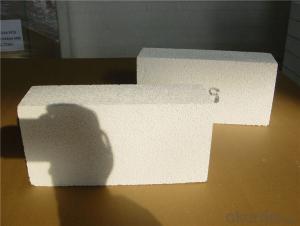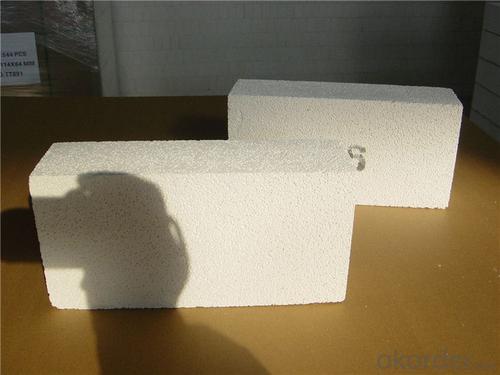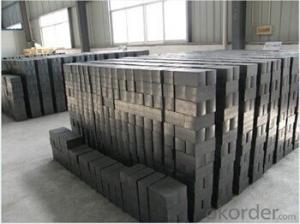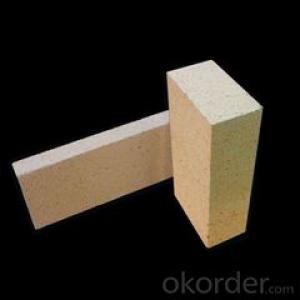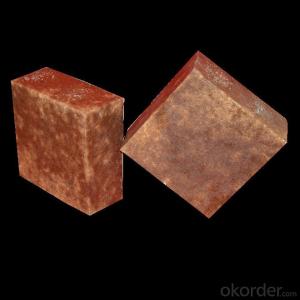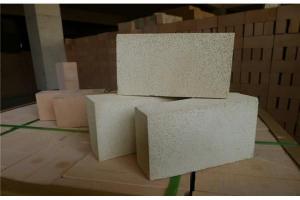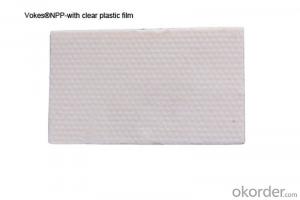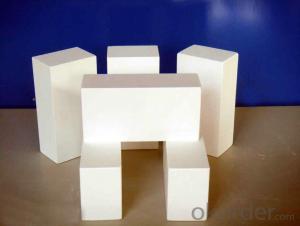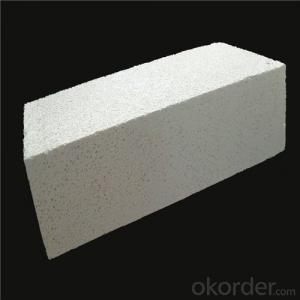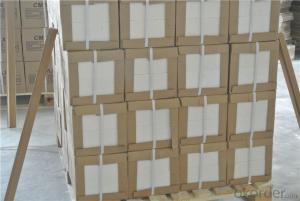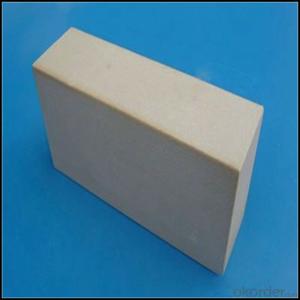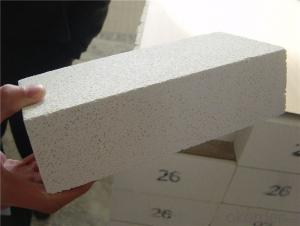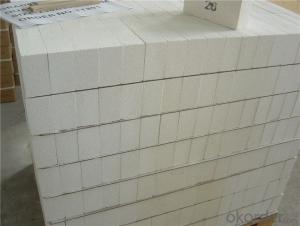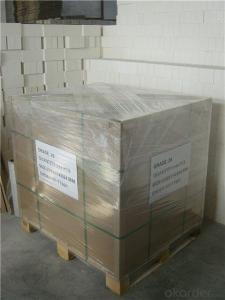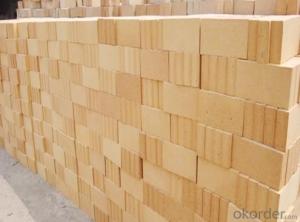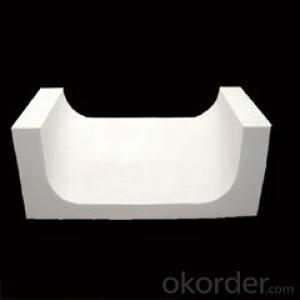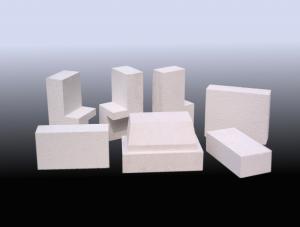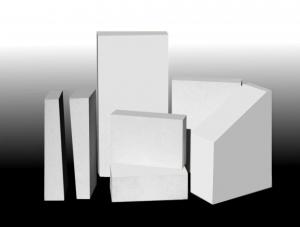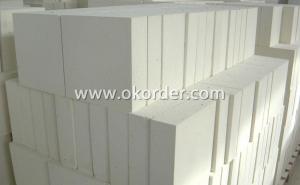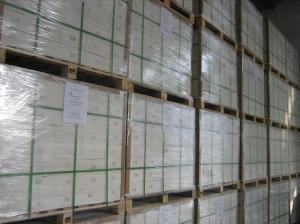High Purity Insulating Fire Bricks - Refractory Clay Insulating
- Loading Port:
- Tianjin
- Payment Terms:
- TT OR LC
- Min Order Qty:
- 10 m.t.
- Supply Capability:
- 10000 m.t./month
OKorder Service Pledge
OKorder Financial Service
You Might Also Like
CNBM conforms strictly to the requirements of ISO 9000 quality control system during the production. MSDS is also available if you want. The thermal insulation fire clay brick meet with the requirements of ASTM & JIS standards. So please stay cool with our quality.
Application
Insulating Fire Brick are used for the lining of converter, alternating current arc furnace, direct Current arc furnace and the ladle slag line, etc.
Insulating Fire Brick Technical index
Brand Quality | JM23 | JM26 | JM28 | JM30 | JM32 | |
Bulk Density (g/cm3) | 0.52 | 0.78 | 0.88 | 1.03 | 1.25 | |
1.2 | 1.6 | 2.1 | 2.5 | 3.5 | ||
Modulus of Rupture (Mpa) | 0.9 | 1.4 | 1.6 | 2.1 | 2.1 | |
-0.5 | 1400℃ -0.4 | 1510℃ -0.5 | 1620℃ -0.9 | 1730℃ -0.9 | ||
Thermal Expansion 1100℃(%) |
0.5 |
0.7 |
0.8 |
0.9 |
1.1 | |
Thermal conductivity(W/m.k)
| 400℃ | 0.14 | 0.27 | 0.32 | 0.41 | 0.49 |
600℃ | 0.16 | 0.29 | 0.34 | 0.43 | 0.50 | |
800℃ | 0.18 | 0.31 | 0.36 | 0.44 | 0.51 | |
1000℃ | 0.20 | 0.33 | 0.38 | 0.45 | 0.53 | |
Al2O3 | 37 | 58 | 67 | 73 | 77 | |
Fe2O3 | 0.7 | 0.7 | 0.6 | 0.5 | 0.4 | |
Equipment
1 unit of Ceramic Abrasive (SG Abrasive) pilot production line
2 units of Compact grain Abrasive pilot production lines
1 unit of high-end coated abrasives (abrasive cloth) production line
2 units of Boron Carbide production lines
3 large flexible crushing and sieving lines for grit production lines
2 units of 2000KVA furnaces for Boron Carbide fusion
6 units of 5000KVA-10000KVA dumping type electric arc furnaces for Brown Fused Alumina fusion
Company Advantage
(1)Long Insulating Fire Brick manufacture history: 25 years manufacturer
(2)Advanced equipment
(3)Diversification of production standards: ISO ANSI FEPA JIS ASTM
(4)Flexible payment: T/T L/C D/P D/A
(5)Professional marketing team and after-sale service
(6)Free sample
FAQs
Q1 |
What’s the transport method? |
A1 | FCL delivery goods with wooden pallet or wooden case by sea; If LCL delivery, must with wooden case; Sometimes need open top, flat rack or bulk cargo. |
Q2 |
What’s the required payment term? |
A2 | Generally 30% TT as the prepayment, 70% TT before delivery. If need, 100% Irrevocable Letter of Credit or negotiation. |
Q3 |
Which country are our products exported to? |
A3 | Apart from entire Chinese market, the US, Russia, Japan, Korea, Australia and some Southeast Asian Nations. |
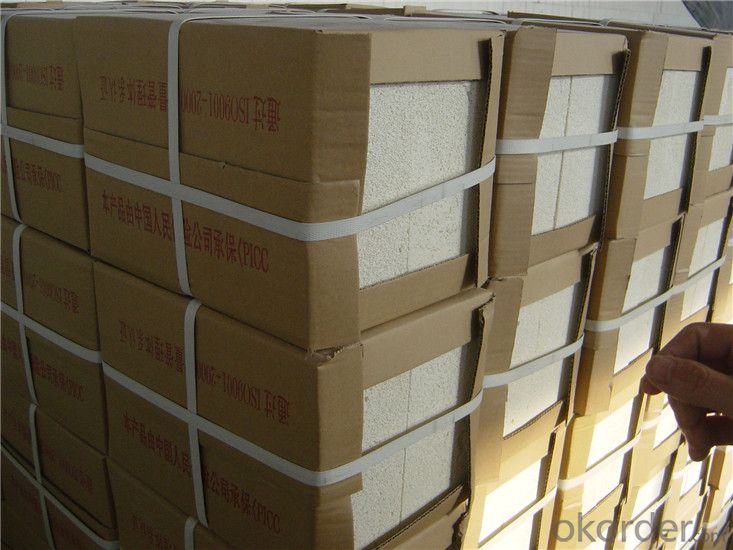
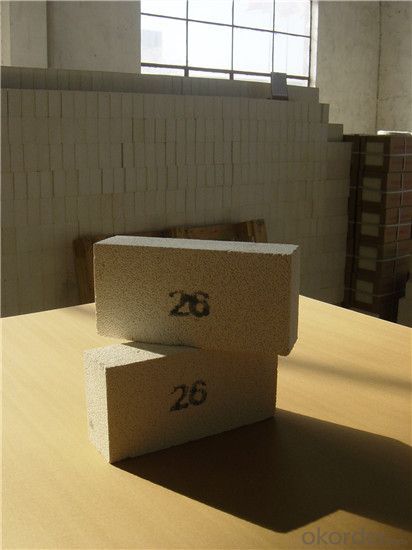
- Q: Can insulating fire bricks be used for insulation in flues?
- Insulating fire bricks are specifically designed for high-temperature applications and are commonly used in furnaces, kilns, and other industrial settings. While they are excellent for insulating heat and preventing heat loss in these environments, they are not recommended for use in flues. Flues are subjected to extreme temperatures, corrosive gases, and the potential for soot and creosote buildup. Insulating fire bricks are not designed to withstand these conditions and may deteriorate or crack over time when exposed to the acidic and corrosive gases produced by combustion. For insulation in flues, it is best to use materials that are specifically made for this purpose, such as refractory cement or ceramic fiber insulation. These materials are more resistant to the harsh conditions found in flues and are better suited to provide effective insulation while ensuring the safety and durability of the flue system.
- Q: Can insulating fire bricks be used in rocket stoves?
- Insulating fire bricks are indeed suitable for use in rocket stoves. Their high insulation properties make them a popular choice. These bricks are composed of lightweight refractory materials, such as silica, which have low thermal conductivity. As a result, they can endure high temperatures while minimizing heat loss. This makes them an ideal option for rocket stoves. Rocket stoves are designed to burn biomass fuel, like wood or charcoal, efficiently. They do this by creating a combustion chamber with a vertical chimney. Insulating fire bricks can be used to construct the combustion chamber and line the chimney. This ensures that the heat generated by the fire is effectively contained and directed towards the cooking surface. Using insulating fire bricks allows rocket stoves to achieve higher temperatures and maintain them for longer periods. This leads to more efficient and effective cooking, as well as reduced fuel consumption. Furthermore, the insulating properties of these bricks also help protect the surrounding environment from excessive heat, reducing the risk of accidental burns or fires. In conclusion, insulating fire bricks are a suitable choice for rocket stoves due to their ability to withstand high temperatures, minimize heat loss, and improve cooking efficiency.
- Q: Can insulating fire bricks be used in high-temperature insulation for cryogenic applications?
- No, insulating fire bricks are not suitable for high-temperature insulation in cryogenic applications.
- Q: Can insulating fire bricks be cut or shaped using common tools?
- Yes, insulating fire bricks can be cut or shaped using common tools such as saws, chisels, or grinders.
- Q: Can insulating fire bricks be used to build pizza ovens?
- Indeed, pizza ovens can be constructed using insulating fire bricks. These bricks are specifically designed to endure high temperatures and offer exceptional insulation, rendering them a suitable choice for pizza oven construction. With their low thermal conductivity, these bricks aid in retaining and evenly distributing heat throughout the oven. The insulating qualities of the bricks facilitate the attainment and maintenance of the desired temperature, ensuring efficient and consistent pizza cooking. Moreover, the lightweight nature of insulating fire bricks simplifies handling and installation during the construction process. All in all, due to their capacity to withstand high temperatures and provide efficient insulation, insulating fire bricks prove to be an excellent option for pizza oven construction.
- Q: Do insulating fire bricks require any special anchors or supports for installation?
- Yes, insulating fire bricks do require special anchors or supports for installation in certain applications. Insulating fire bricks are lightweight and have low thermal conductivity, making them ideal for use in high-temperature environments such as furnaces, kilns, and fireplaces. However, due to their lightweight nature, they can be prone to movement or displacement under certain conditions. To ensure the stability and integrity of the insulating fire bricks, it is recommended to use special anchors or supports during installation. These anchors or supports are typically made of metal, such as stainless steel, and are designed to securely hold the bricks in place. They help prevent the bricks from shifting or falling out, especially when exposed to vibrations, thermal expansion/contraction, or other external forces. The type and design of the anchors or supports depend on the specific application and installation requirements. Common types of anchors include V anchors, U anchors, and L anchors, which are embedded into the surrounding refractory material or attached to a structural frame. The anchors or supports should be properly spaced and installed according to the manufacturer's guidelines to ensure adequate support and stability of the insulating fire bricks. In summary, while insulating fire bricks offer excellent thermal insulation properties, they do require special anchors or supports for installation in order to prevent movement or displacement. These anchors or supports play a crucial role in maintaining the structural integrity and longevity of the insulating fire brick system.
- Q: Are insulating fire bricks suitable for thermal insulation in boilers?
- Insulating fire bricks prove to be a suitable option for thermal insulation in boilers. They are specifically engineered to possess exceptional insulating abilities, enabling them to efficiently diminish heat transfer in environments with high temperatures, like boilers. These bricks are crafted from lightweight materials and possess a low thermal conductivity, thus rendering them highly suitable for applications related to thermal insulation. By incorporating insulating fire bricks in boilers, energy efficiency can be enhanced by minimizing heat loss and ensuring optimal utilization of the boiler-generated heat. Moreover, these bricks exhibit remarkable resistance to elevated temperatures and can endure the harsh conditions prevalent within a boiler, thereby establishing themselves as a dependable choice for thermal insulation.
- Q: Can insulating fire bricks be used for insulation in petrochemical plants?
- Yes, insulating fire bricks can be used for insulation in petrochemical plants. Insulating fire bricks have high thermal resistance and can withstand high temperatures, making them suitable for insulation in petrochemical plants where heat containment is crucial.
- Q: Can insulating fire bricks be used in the construction of industrial furnaces?
- Indeed, the utilization of insulating fire bricks is viable in the creation of industrial furnaces. These bricks are specifically engineered to endure elevated temperatures and thermal shocks, rendering them suitable for deployment in furnaces operating at exceedingly high levels of heat. Their thermal conductivity is notably low, thereby reducing heat dissipation and enhancing the energy efficiency of the furnace. Moreover, these fire bricks exhibit a lightweight composition and are effortlessly maneuverable, thereby proving to be convenient for construction endeavors. In summary, the superb insulation capabilities and heat-resistant attributes of insulating fire bricks position them as an optimal selection for the construction of industrial furnaces.
- Q: Are insulating fire bricks resistant to chemicals?
- Yes, insulating fire bricks are generally resistant to chemicals. They are specifically designed to withstand high temperatures and resist the corrosive effects of chemicals, making them suitable for various industrial applications.
Send your message to us
High Purity Insulating Fire Bricks - Refractory Clay Insulating
- Loading Port:
- Tianjin
- Payment Terms:
- TT OR LC
- Min Order Qty:
- 10 m.t.
- Supply Capability:
- 10000 m.t./month
OKorder Service Pledge
OKorder Financial Service
Similar products
Hot products
Hot Searches
Related keywords
